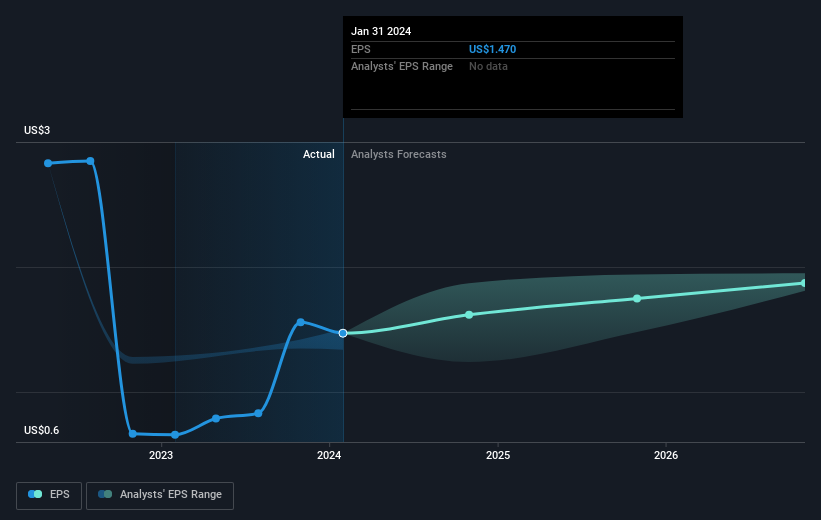On average, over time, stock markets tend to rise higher. This makes investing attractive. But if you choose that path, you’re going to buy some stocks that fall short of the market. For example, the Hewlett Packard Enterprise Company (NYSE:HPE), share price is up over the last year, but its gain of 22% trails the market return. The longer term returns have not been as good, with the stock price only 8.5% higher than it was three years ago.
After a strong gain in the past week, it’s worth seeing if longer term returns have been driven by improving fundamentals.
Check out our latest analysis for Hewlett Packard Enterprise
While markets are a powerful pricing mechanism, share prices reflect investor sentiment, not just underlying business performance. One imperfect but simple way to consider how the market perception of a company has shifted is to compare the change in the earnings per share (EPS) with the share price movement.
Hewlett Packard Enterprise was able to grow EPS by 124% in the last twelve months. This EPS growth is significantly higher than the 22% increase in the share price. So it seems like the market has cooled on Hewlett Packard Enterprise, despite the growth. Interesting. This cautious sentiment is reflected in its (fairly low) P/E ratio of 11.81.
The company’s earnings per share (over time) is depicted in the image below (click to see the exact numbers).
We know that Hewlett Packard Enterprise has improved its bottom line lately, but is it going to grow revenue? This free report showing analyst revenue forecasts should help you figure out if the EPS growth can be sustained.
What About Dividends?
It is important to consider the total shareholder return, as well as the share price return, for any given stock. The TSR is a return calculation that accounts for the value of cash dividends (assuming that any dividend received was reinvested) and the calculated value of any discounted capital raisings and spin-offs. So for companies that pay a generous dividend, the TSR is often a lot higher than the share price return. In the case of Hewlett Packard Enterprise, it has a TSR of 26% for the last 1 year. That exceeds its share price return that we previously mentioned. This is largely a result of its dividend payments!
A Different Perspective
Hewlett Packard Enterprise provided a TSR of 26% over the last twelve months. Unfortunately this falls short of the market return. The silver lining is that the gain was actually better than the average annual return of 6% per year over five year. It is possible that returns will improve along with the business fundamentals. It’s always interesting to track share price performance over the longer term. But to understand Hewlett Packard Enterprise better, we need to consider many other factors. Consider risks, for instance. Every company has them, and we’ve spotted 3 warning signs for Hewlett Packard Enterprise you should know about.
For those who like to find winning investments this free list of growing companies with recent insider purchasing, could be just the ticket.
Please note, the market returns quoted in this article reflect the market weighted average returns of stocks that currently trade on American exchanges.
Have feedback on this article? Concerned about the content? Get in touch with us directly. Alternatively, email editorial-team (at) simplywallst.com.
This article by Simply Wall St is general in nature. We provide commentary based on historical data and analyst forecasts only using an unbiased methodology and our articles are not intended to be financial advice. It does not constitute a recommendation to buy or sell any stock, and does not take account of your objectives, or your financial situation. We aim to bring you long-term focused analysis driven by fundamental data. Note that our analysis may not factor in the latest price-sensitive company announcements or qualitative material. Simply Wall St has no position in any stocks mentioned.







